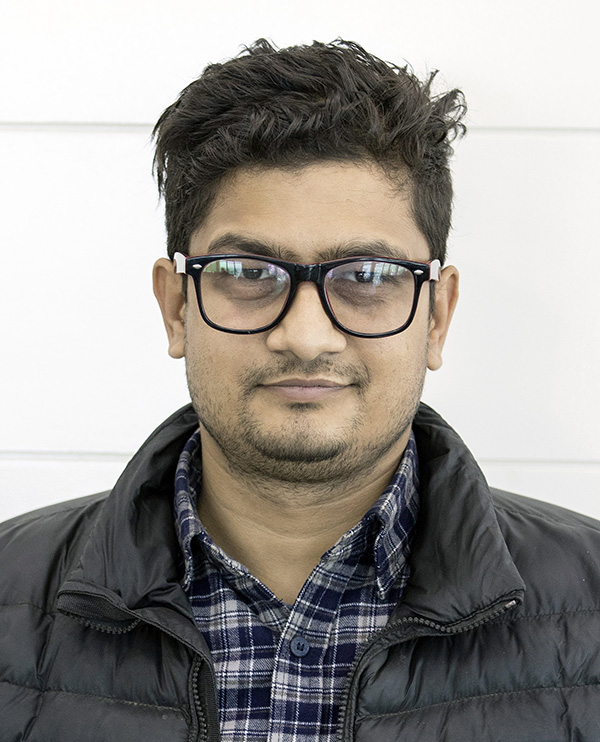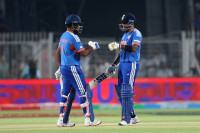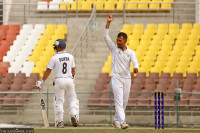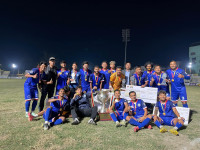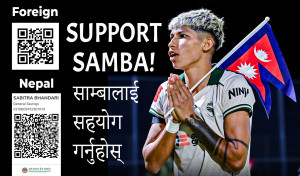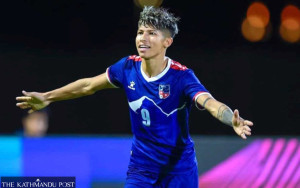Sports
From the hills of Gulmi to representing the country
Thirty-year-old Kul Bahadur Thapa has been an integral part of the national men’s volleyball team for the last seven years.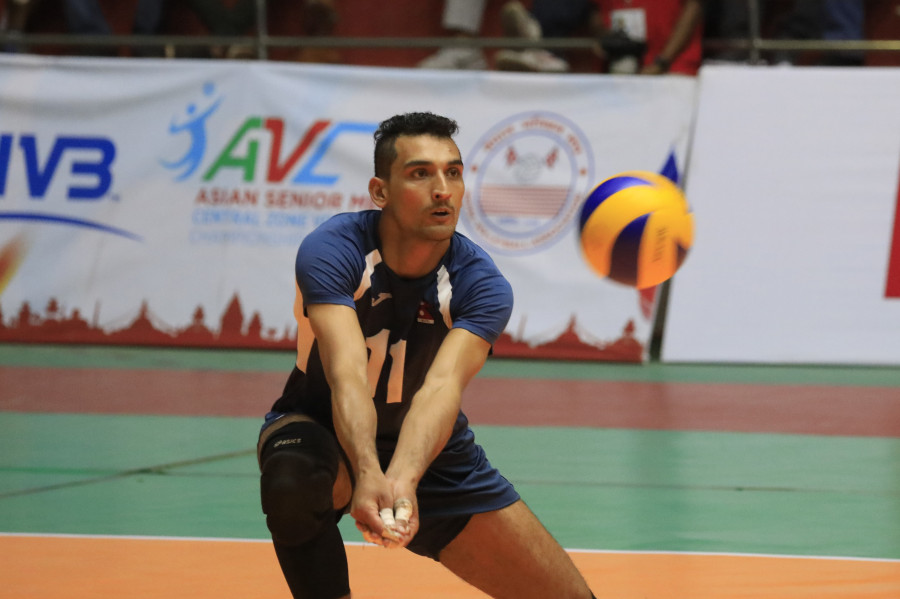
Sailendra Adhikari
One evening, Kul Bahadur Thapa was watching a quiz show on television. The person taking part in the quiz was asked what the national sport of Nepal was. The person confidently replied ‘dandibiyo’. Thapa not only laughed at his reply, but he was also taken aback by the fact that a well-educated person had it all wrong.
“It is no surprise that a lot of people are still totally unaware that volleyball was declared as the national game in 2017. People consider ‘dandibiyo’ still our national game,” Thapa said with a giggle. The 30-year-old national volleyball player thinks it is high time that the game now is given more recognition and promotion like cricket and football.
Born at Shantipur in Gulmi, Thapa was one of the seven children in a large family. He was drawn towards the game since very young.
"There was no football or cricket ground. People mostly played volleyball,” he said. An individual with extraordinary height, Thapa soon became a popular name in the game in his village. After completing his School Level Certificate examination at the age of 17, Thapa started playing ward-level volleyball matches and was rather good at it. One day, Thapa was approached by one Nar Bahadur Kunwar—a senior in his village and a Nepal Police personnel—to apply in Nepal Police volleyball team. “He said I was good at volleyball and joining the Nepal Police Club would also give me a job opportunity. So I went to Kathmandu,” Thapa recalled.
But things in Kathmandu didn’t go as smoothly as Thapa had hoped. There were already a lot of players and they were waiting for their turn break into the team. “I normally had to wait outside the court for my turn to play. There were many others and my chances of playing for Nepal Police were slim,” Thapa remembers. That reality prompted Thapa to approach another departmental team Armed Police Force with his friend Chandra Kunwar. APF agreed to take in Thapa but rejected Kunwar. Kunwar and Thapa were childhood friends and they also grew up together. It gave a bad taste and Thapa too decided not to pursue his volleyball career with APF.
Thapa instead headed back to Gulmi to represent his district. They won their first competition in Butwal in 2008. Thapa soon made his way into the Western Region team. In 2008, during the Ganatantrik Khel Mahotsav, Thapa won the Best Spiker award while playing for Western Region. “I still remember that tournament where I won my first individual award. It was boycotted by departmental teams over then-Maoist’s participation,” Thapa said. Thapa’s Western Region team also defeated APF in 2009 during the national volleyball tournament in Butwal to secure third place.
It was an extraordinary feat for the team to defeat one of the volleyball powerhouses of the country. Thapa then played for Sahid Smriti Majdoor Club, a club formed by the then-Maoists outfits, for a couple of years. It was then when he came in contact with Em Bahadur Magar, the current national volleyball team captain. Magar used to play for Nepal Police and he and other Nepal Police players urged Thapa to join the departmental outfits. Thapa went to Butwal for selection and passed the fitness test. He finally got selected and earned a job at Nepal Police in 2010 and started playing for them.
Despite being one of the best volleyball players in the country and playing regularly for Nepal Police, Thapa had to wait for two years to break into the national team.
“There were simply no tournaments. It was in 2012 when coach Kapil Kishor Shrestha finally gave me the break against Afghanistan.”
Ever since then, Thapa has been an integral part of the men's national volleyball team. He was arguably the country's best player in the recently concluded AVC Asian Senior Men’s Central Zone Volleyball Championship, where Nepal finished fifth after recording just a win against Afghanistan. But Thapa believes they could have done better. “We had a new coach and a very good one. But the problem for us was that we could not implement everything the coach wanted to do due to a short preparation time. We need more time and more practice going into such a tournament,” said Thapa.
Nepal’s Dutch coach Han Abbing was appointed prior to the tournament on a three-month contract. Thapa said the short time meant, despite the player giving their all, their performance was not up to the standard the coach or the supporters wanted. Abbing also said players lacked match exposure. He also praised Thapa for his performance in the championship. “Thapa is one of the few players with more experience than others. His spiking and receiving techniques are good and he has exceptional leadership skills. He is always there to give confidence to the younger members,” said coach Abbing.
As a national player, Thapa believes there are a lot of areas Nepal needs to address in volleyball. He believes the playing techniques are still traditional in the country. "There are new techniques, new methods but we don’t follow them. I learned many new things after joining the national team. There have been good coaches who helped us grow, know the game better and play it better," he said. Volleyball is a popular game, he says, but not at the level of cricket or football in the country. He also calls for opening more volleyball academies and increase the number of sports at the grassroots level. “We play football in U-16, U-18 levels, why can’t we go with the same model in volleyball,” he quipped.
Thapa believes he will continue playing until his body allows him to play. On life after the volleyball court, Thapa said he wants to nurture the budding young volleyball players. “This game has given me name and fame. My love of this game will continue,” said Thapa. Thapa believes one should work very hard and remain focused and dedicated to succeed in any sport.
“I believe volleyball has a good future in our country. There are more players coming in to play the game. If we can produce good players, that player will also get a good chance of playing in international tournaments,” Thapa said. “It’s not that you can make millions from this game, but whatever you make, it is going to be sufficient for you,” he added.
***
What do you think?
Dear reader, we’d like to hear from you. We regularly publish letters to the editor on contemporary issues or direct responses to something the Post has recently published. Please send your letters to [email protected] with "Letter to the Editor" in the subject line. Please include your name, location, and a contact address so one of our editors can reach out to you.




 9.83°C Kathmandu
9.83°C Kathmandu